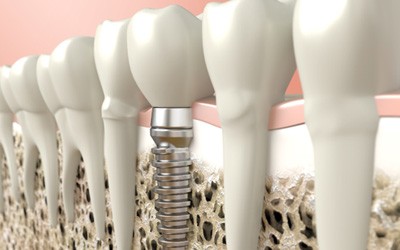Dental Implants – Northbrook, IL
Completely Replacing Teeth from the Roots Up

Tooth replacements have become more and more lifelike. Dental implants are currently considered to be the ideal tooth loss solution thanks to their ability to mimic the roots as well as the crowns of missing teeth. If you want your new smile to look and feel like your original one, Dr. James Woodruff and Dr. Justin Woodruff may recommend dental implants in Northbrook. Schedule a consultation at Northbrook Dental Group today to see if this modern tooth replacement option is right for you.
Why Choose Northbrook Dental Group for Dental Implants?
- Entire Dental Implant Procedure Performed In-House
- Affordable Dental Financing Available
- State-of-the-Art Dental Technology and Techniques
What Are Dental Implants?

A dental implant has three main parts: a post made out of biocompatible titanium, a prosthetic that mimics your natural teeth (also known as a restoration), and a connector piece called an abutment. The post is inserted into the jawbone, and a process called osseointegration takes place, causing the titanium to form a strong bond with the bone tissue. The prosthetic tooth or teeth will be attached to the post via the abutment. Once all the pieces are in place, you’ll have a smile that feels natural while also looking incredibly lifelike.
The 4-Step Dental Implants Process

Dental implants replace the entirety of the missing teeth, including the roots. To achieve this, they require a multi-step process that takes several months. Then you will be able to experience all of the amazing benefits that dental implants have to offer. While each patient’s dental implant experience is slightly different, the entire process can be broken down into four steps. Here’s what you can expect.
Initial Dental Implant Consultation

We begin the dental implant process with a consultation. We will need to confirm that you’re a candidate for dental implant surgery as well as whether you will need any preliminary treatments like bone grafting beforehand. If your jaw and gums are in good shape, we can move on to the rest of the dental implant procedure, including discussing the cost and timeframe.
Dental Implant Surgery

The surgery to place dental implants is performed in-house at Northbrook Dental Group. This makes the process much more convenient for you, as you won’t have to worry about visiting a specialist across town. First, your mouth will be numbed with a local anesthetic, so you don’t feel a thing. Next, an incision is made in the gum tissue and the dental implants are inserted into the jawbone. Lastly, the gums are closed, and protective caps are placed over the end of the dental implants to keep them safe as the area heals.
Dental Implant Osseointegration & Abutment

Once implants are placed, the process of osseointegration begins. It usually takes about three to six months. An abutment can be attached to each implant once osseointegration is complete. Once healed, metal abutments are attached to the dental implants, and impressions are taken of the area.
Delivery of Dental Implant Restorations

After you’ve received abutments and your mouth has fully healed, we will take impressions to design your restoration. You will return to our office one last time once the final restoration is ready to be placed. If everything looks and feels as it should, you will be sent on your way to show off your smile!
Benefits of Dental Implants

More than 500,000 dental implants are placed each year, so they are rapidly becoming of the most popular methods for replacing lost teeth. Since they fuse to the jawbone through the natural process of osseointegration, these incredible prosthetic devices can deliver an array of remarkable benefits that traditional restorations like bridges and dentures cannot match. Here’s a brief overview of a few of the ways in which dental implants from Northbrook Dental Group can enhance your health and quality of life.
Day-to-Day Benefits

Dental implants offer many benefits that can improve a patient’s daily life such as:
- Giving patients the chewing power they need to enjoy all sorts of tasty and textured foods like juicy steaks, snappy raw fruits and veggies, and crunchy nuts and seeds.
- Being easy to brush and floss, meaning patients won’t have to worry about time-consuming specialized nightly cleaning rituals like those required by traditional dentures or bridges.
- Holding their place securely in the mouth so the patient won’t have to worry about their restorations causing embarrassment by sliding out of place during meals or conversations.
- Restoring a patient’s confidence so they can smile proudly and frequently at friends, family, neighbors, coworkers, and strangers.
Health Benefits

Dental implants can also deliver several astounding benefits for a patients oral and overall health. These include:
- Restoring the patient’s biting power so they can effectively and thoroughly chew all sorts of foods. This can help them digest meals and snacks comfortably and avoid issues like malnutrition.
- Providing the exercise the jawbone needs to stay healthy and strong. This can prevent or even reverse the process of bone atrophy that begins after tooth loss and help the patient maintain a robust and youthful profile for many years.
- Supporting the surrounding teeth to keep them from drifting out of place. This can prevent dental misalignments that can increase the patient’s risk of oral infections, dental injury, and tooth loss.
- Evenly distributing the pressure of chewing to prevent unnecessary dental wear and jaw stain.
- Simple cleaning requirements make it easy to avoid painful and destructive oral infections such as tooth decay and gum disease.
Long-Term Benefits

Dental implants can also benefit a person’s health and pocketbook in many ways over the long term. A few of these perks include:
- An incredible success rate of over 95% even ten years after being placed, which makes implants a smart and sound investment in a patient’s appearance and oral health.
- Possibly lasting decades or even a lifetime if they receive excellent care and hygiene, which can save thousands of dollars that would have been spent on costly replacements for traditional dentures and bridges over the years.
- Making it easier to leave a favorable first impression in work situations or on the social scene. This can make it easier to meet people, build rapport, win trust, close sales, and make friends. Some patients may even find that implants make it easier for them to distinguish themselves from the competition during job interviews or when being considered for a promotion.
Who Dental Implants Can Help

Are dental implants right for you? That’s a question that can only be answered at your initial consultation. That said, we can share some helpful information, including the qualities we look for in a good candidate. If you are interested in learning more, simply read on or give us a call to schedule an appointment!
Who Is a Good Candidate for Dental Implants?

If you are struggling with tooth loss, then there’s a good chance that you’re a candidate for dental implants in Northbrook, so don’t hesitate to reach out to us! From there, we can complete a comprehensive oral exam and determine:
- If you’re willing to commit to good habits, like flossing consistently
- If your gums are healthy
- If you’re in good overall health
- If you have a healthy jawbone
- If you don’t mind a process that can take months to complete
If we decide together that dental implants are the best choice for rebuilding your smile, we can recommend one of the following treatments based on how many teeth have been lost.
Missing One Tooth

Missing just one tooth? Whether it’s a molar or one of your front teeth, we have good news: we can fill the open space with a dental implant. The first step is surgically inserting it into your jawbone and allowing osseointegration to take place. Then, we will secure a dental crown on top. The materials used to make the crown will be expertly shaded so that they match the teeth around them, ensuring the final result looks as good as it feels.
Missing Multiple Teeth

For a single large gap left by three or more consecutive teeth, two dental implants are inserted into the jaw to support a dental bridge. If there is more than one gap to fill, several dental implants will be placed in specific areas; they’ll be used to support a partial denture that replaces all the teeth at once. To put it simply, this state-of-the-art tooth-replacement solution is an option whether you’re struggling with mild or severe tooth loss, so don’t hesitate to take the next step: schedule a consultation.
Missing All Teeth

If you are missing all of your teeth, traditional dentures are no longer the only solution. With implant dentures, we can secure four to eight dental implants throughout the jaw at specific locations and angles. Then, a custom denture can be attached to the posts, effectively replacing all of your teeth at once.
Important note: Implant dentures are usually made to be fixed in place at all times, but there is a removable option as well, depending on what you prefer.
Understanding the Cost of Dental Implants

You will not know exactly how much dental implants cost until you’ve had a consultation at our dental office. We will then go over the factors that affect how much you pay, including bone grafts, gum disease treatment, and the number of implants placed. Compared to traditional dentures and bridges, dental implants are meant as a more long-term solution to tooth loss; they can potentially stay in your mouth the rest of your life without needing to be replaced. Oftentimes, they are the more cost-effective option in the long run.
Maintaining & Caring for Your Dental Implants

Dental implants are by far the best tooth replacement option available today. One of their most incredible benefits is the fact that they have a success rate of over 95% and can last upwards of three decades or longer. To achieve this, it’s important that you maintain and care for your tooth replacement properly. Here are some steps you need to implement to keep your smile in tip-top shape!
Make Oral Hygiene a Priority

Dental implants don’t get cavities like natural teeth do because they aren’t made from tooth enamel. However, your surrounding natural teeth are still at risk, and there is still a possibility of developing gum disease. Gum disease is detrimental for dental implants as it is the most common reason for dental implant failure. Remember to brush twice, floss, and rinse with mouthwash every day to keep your gums healthy and your dental implants stable.
Eat a Healthy Diet

One of the exciting benefits of dental implants is that you can enjoy a complete, nutritious diet. You don’t need to adhere to any eating restrictions. However, you should still do your best to avoid having too many food items that are particularly sugary or tough. Instead, eat plenty of foods that are high in calcium and vitamin C. These nutrients are necessary to make your jaw and gums healthy.
Break Bad Habits

Bad habits can cause a variety of issues for teeth and dental implants if you aren’t careful. It’s best to refrain from using tobacco products – especially as you recover from your procedure. Smoking slows down the healing process, making it more difficult for your body to fight off infections. You should also avoid using your teeth to open bottles, rip through packaging, and complete other tasks. Instead, find the appropriate tool so you don’t cause any harm to your teeth or implants.
Protect Your Dental Implants

Dental implants are incredibly strong, but they aren’t completely indestructible. You should always wear a mouthguard while engaging in contact sports. If you grind your teeth at night, you should ask your dentist if you might benefit from wearing a nightguard to protect your teeth from wear and tear.
Schedule Regular Dental Checkups

You should continue to see your dentist for routine cleanings and checkups twice a year. This way, we can monitor your dental implants, natural teeth, and gum tissue. We will also complete an oral cancer screening. By detecting issues early, we are more likely to be able to address them quickly, preventing serious complications in the future.
Dental Implant FAQs
So, maybe you have concerns about dental implants. Fair enough – you don’t want to jump into a treatment too quickly. If possible, knowing the basics is better before you decide on care. Luckily, we at Northbrook Dental Group can help out: listed below are some oft-asked implant questions and their respective answers. By reading them, you’ll get a sense of how these prosthetic teeth work. Otherwise, please call our office for more details.
Are Dental Implants Safe?
When placed by a qualified dentist, dental implants are pretty safe. They won’t harm your teeth, gums, or other mouth tissues. On the contrary, they’ll only enhance your life!
That said, implant patients should have good oral health before surgery. Those with low jawbone density or gum disease won’t have a successful treatment. Luckily, the dentist can fix such issues beforehand. You’ll then have a safer and more effective surgery.
If you have diabetes, cancer, or similar health problems, talk to your dentist during the consultation. They can settle whether surgery would be too risky or not.
How Successful Are Dental Implants?
Usually, dental implants are very successful in the long run. They seldom fail when properly placed by a dentist. In fact, their ten-year success rate exceeds 95%!
Of course, your implants’ success partly depends on your lifestyle. These prosthetic teeth need daily care to work well. In particular, you’ll need to practice good oral hygiene, routine checkups, a healthy diet, and more. Otherwise, your restored smile will falter rather soon.
You should also take note of your implant’s location. One acting as a molar will receive more strain than a front tooth. As such, it may have a slightly higher risk of failure.
How Long Does It Take to Recover from Dental Implant Surgery?
After implant placement, you won’t need long to recover. Most patients can resume normal life the day after surgery. Still, avoid harsh exercise for the first week following your treatment. Such activity will delay the healing process. (You should also take pain medicine as directed.)
All that said, your jaw will take longer to heal from treatment. Implants usually need six months (or more) to fuse with your jawbone. Before that period ends, you’ll want to be careful. Bad oral habits could interfere with the fusion process.
Will People Be Able to Tell That I Have Dental Implants?
You can rest easy – people won’t notice you have dental implants. The latter are designed to blend seamlessly with adjacent teeth.
Firstly, implants are custom-made for your mouth. Lab workers base them on dental impressions of your smile. As such, the prosthetics will match their surroundings in shape, color, and size.
Furthermore, remember how implants work. They fuse with your jaw to act like tooth roots. In other words, they remain stable and secure. You won’t have to hold your jaw strangely to keep them in place.
